Every Purchase Supports Women Artisans. Shop to Make a Difference!
Striving for Equality: Wearsos' Approach to Addressing Gender Inequity in Rural Costa Rica

Gender Inequality in Costa Rica
In today's world, women often encounter more significant hurdles—be it unemployment rates, workplace biases, or unequal treatment compared to men. For the women of Costa Rica, navigating through structural systems of inequality poses a distinct challenge. Sadly, poverty rates among women remain notably higher than men. Even when women secure employment, they statistically earn 17.2% less than their male counterparts in similar roles. This disparity hits harder for women residing in remote areas like Turrialba and Mollejones, where gender inequality persists. In this blog post, we'll discuss the underlying causes of gender disparity and women's unemployment in Costa Rica, and share Wearsos' impactful approach in addressing these issues.
Lack of Economic Opportunities
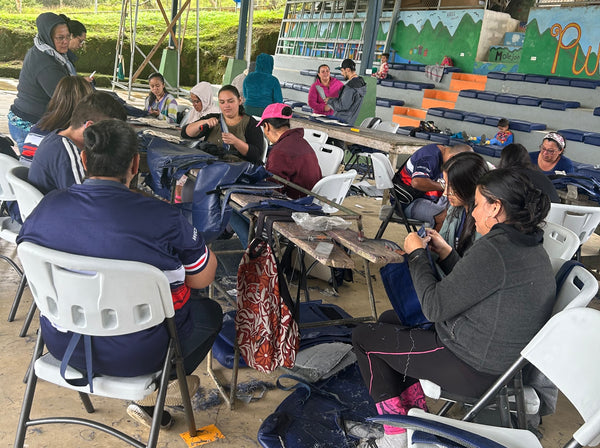
The Problem
The two largest economic industries in Costa Rica are tourism and agriculture. However, due to the remote locations of Turrialba and Mollejones, tourism opportunities remain limited. Specifically women face steep challenges finding work, often resorting to desperate measures in order to support their families.
Wearsos’ Response
In response to the scarcity of economic opportunities in rural Costa Rica, Wearsos has created an innovative solution. In the remote community of Mollejones, where an easy bus route is non-existent and there very few job opportunities, we empower approximately 20 women to strip, disarm, and clean Southwest Airlines leather airline seats in their community centre. Recognizing that many of these community members balance other responsibilities such as farming, working as rural tourism guides, or looking after their families, women can choose their own schedules to ensure flexibility. Subsequently, the stripped seats are transported to Turrialba, where seven women are employed full-time to upcycle them into bags and accessories. This is a unique opportunity for our staff, as Turrialba’s economy does not currently have a lot of opportunities in the fashion, textile, or arts industries. By providing this alternative form of employment, we directly employ women in Turrialba and work to diversify Turrialba’s economy.
Limited Educational Opportunities
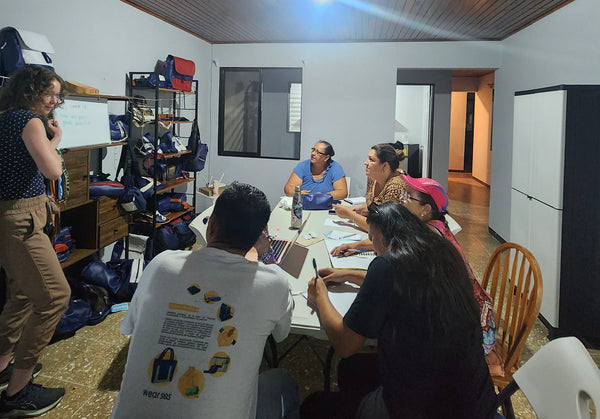
The Problem
Educational opportunities are extremely limited for Costa Rican women, especially in rural areas. For example Mollejones only has a single primary school, and as a result, Mollejones residents typically do not achieve higher than a primary education. Additionally, there are very limited opportunities to learn English, which severely limits employment opportunities. Even in Turrialba, a larger town with a population of 30,000, women seldom pursue higher education, limiting their job prospects.
Wearsos’ Response
At Wearsos, we believe in the transformative power of education and skills training. Our experienced artisan and leather teacher, coaches our new staff through a skills training program. Many artisans initially had no sewing skills, but have now become proficient sewers, boosting their employability and self-confidence. Additionally, Wearsos hires a certified psychologist who provides one-on-one counselling and skill-building workshops to all artisans. After work, our artisans are able to attend and after work English class, learning basic vocabulary and grammar structures. This class is completely voluntary, but many artisans choose to attend every week.
Prevalence of the Informal Labor Sector
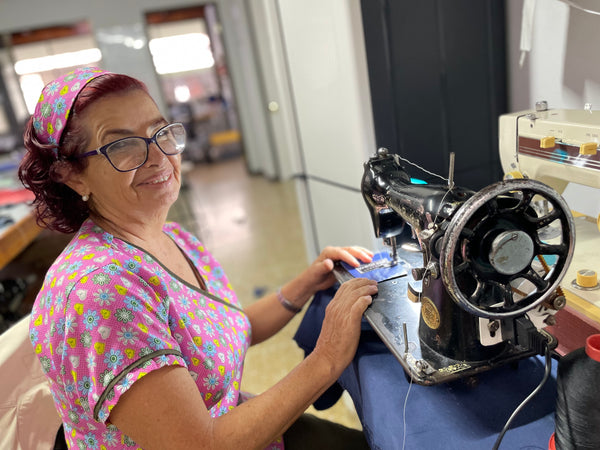
The Problem
Currently, almost 40% of Costa Ricans work in the informal sector, leading to substantial job insecurity and heightened poverty levels. This sector's prevalence significantly impacts women, especially in rural areas, where economic crises tend to hit harder. Women often bear the brunt, being the first to lose jobs, rendering them structurally more vulnerable to poverty compared to men.
Wearsos Response
To counteract this labor insecurity, we've introduced formal job positions for our artisans. These positions come with contracts that outline their rights and extend health benefits to their families. The day our staff received these contracts was truly inspirational for everyone, as many artisans had only previously worked in the informal sector and hadn't experienced the security of an official job contract. Their employment at Wearsos marks a critical step toward ensuring a stable income and improved livelihoods.
Cultural Gender Norms
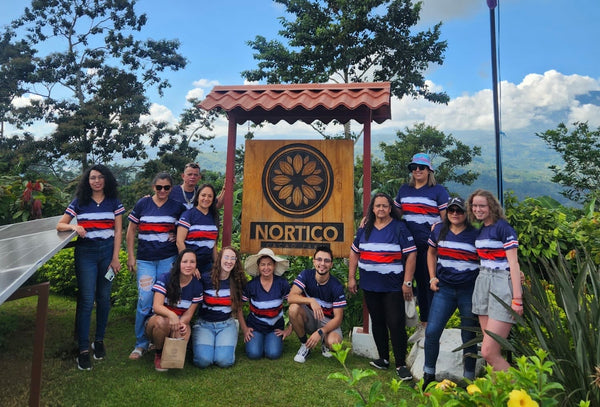
The Problem
In rural Costa Rican communities like Turrialba and Mollejones, gender norms often dictate that women shoulder most of the unpaid care work, limiting their access to education and employment opportunities. Machoism, a cultural mindset emphasizing male dominance, further exacerbates gender inequality, as men often receive preferential treatment in the job market.
Wearsos’ Response
Challenging ingrained gender norms deeply embedded in Costa Rican culture is an integral part of our mission. Beyond formal employment and skills, we empower women through our social programming. Regular monitoring and evaluation, including one-on-one meetings with a psychologist, has revealed that our staff feel empowered at the workplace. This empowerment disrupts the cycle of discrimination, creating a more inclusive and equitable space for women.
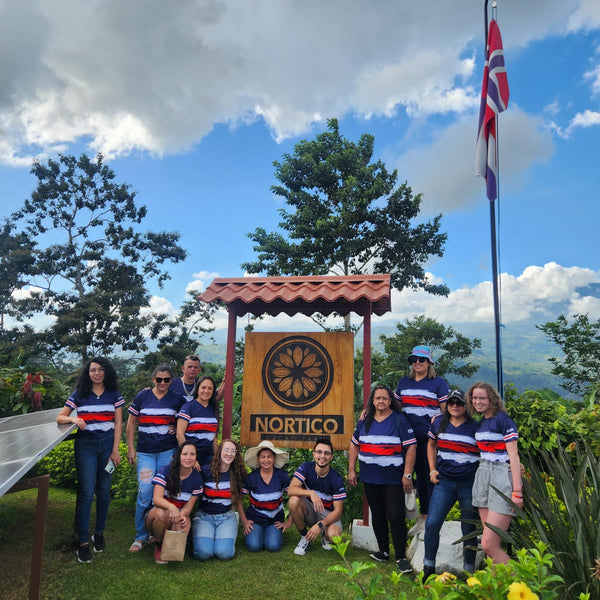
Final Thoughts
The persistent existence of gender inequality in these regions is a result of the mutual reinforcement of these root causes. These factors, when combined with issues such as gender-based violence, deeply ingrained gender roles in Costa Rican culture, and the overwhelming burden of care work falling on women, create a web of challenges that must be addressed to achieve gender equality. Wearsos is committed to dismantling this web, providing women with better opportunities and a path to economic empowerment. Wearsos is committed to addressing the multifaceted issue of gender discrimination and women's unemployment in rural Costa Rica.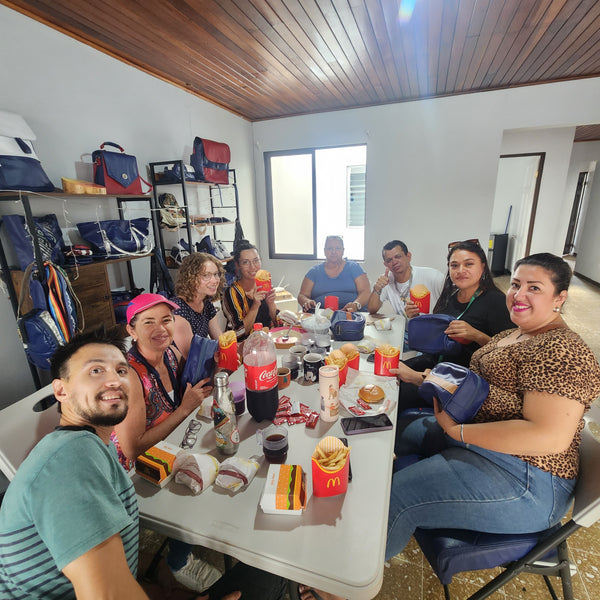
Sources:
International Tourism Decline and its Impact on the Poor
Street Vendors in Costa Rica Are Caught Between Economies
Education in Costa Rica

